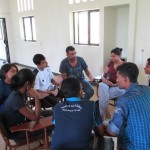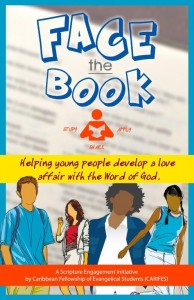(written by Savithri Sumanthiran, Regional Secretary for South Asia)
“பரலோகத்தில் இருக்கிற எங்கள் பிதாவே” was the first Christian prayer I ever learned. I don’t know whether my memory serves me right, but as I recall, I learned the Lord’s prayer first in Tamil from a Lady Bird Book! From then on The Lord’s Prayer has been one of my favourite scriptures.
Shaping a relationship of intimacy with God…
In my early years, this prayer established a routine of prayer for me – no questions asked of it, no answers demanded from it. A a child, I simply prayed it. As I grew up, this prayer became the mainstay of my prayer life: the place where I have conversations and arguments with God; the platform from which I can pray during times when God seems distant and prayer impossible.
Shaping of character in the presence of God…
In my teens, I grappled for the first time with a phrase in this prayer; I had experienced hurts at a personal level, culminating in being confronted by a world that suddenly was no longer safe. I struggled to understand what it means to pray “forgive us our debts as we also have forgiven our debtors” – What did ‘debts’ mean? Who is the ‘us’ in this prayer? Was I to learn to forgive only those who are fellow Christians or was I to forgive the “other” who did violence to me and my community as well? I began the journey of learning what it means to forgive by taking the first steps. And I started to learn the freedom of self-talk that is able to say to myself: “I was wrong; I need to say ‘I am sorry, please forgive me.” And to enter into the scary process of meeting the person I offended or was offended by. This journey continues.
Shaping of a world-view in the presence of God…
Just a little older, praying this prayer introduced me to the idea that somehow Jesus is telling us to want His Kingdom to come, His will to be done – not at some future place but on earth. Until this time, I had internalized this phrase to mean that Jesus desires holiness in my personal life. Another journey of understanding Jesus and His mission began for me! Right now, I am trying to come to terms with why this prayer is all in the plural – “Our” Father, Give “us” this day our daily bread; Forgive “us” our trespasses …; Lead “us” not into temptation; Deliver “us” from evil…
Matthew 6: 9 – 13
Pray then like this:
“Our Father in heaven, hallowed be your name.
Your kingdom come, your will be done, on earth as it is in heaven.
Give us this day our daily bread,
and forgive us our debts, as we also have forgiven our debtors.
And lead us not into temptation, but deliver us from evil.”
- is my safe space – a place to be open and intimate before the Lord;
- is my discomfort space – a place to bring my real world questions and challenges
- is my learning theology space – a place which invites me to enter the world of Jesus; to have conversations with fellow believers; to read what others have written.
Savithri Sumanthiran, Savithri.Sumanthiran(at)ifesworld.org











